An Accounting Cover Letter is written to a hiring manager or recruiter by an individual to highlight their skills, qualifications, and experiences as part of their application for an accountant position.
A cover letter presents you with an opportunity to showcase why you are a great fit for an accountant position and why you should be hired. It is written to supplement your resume and is more detailed. It marks your first engagement with the recruiter, and if well-written, it increases your chances of securing the accountant job.
Free Templates
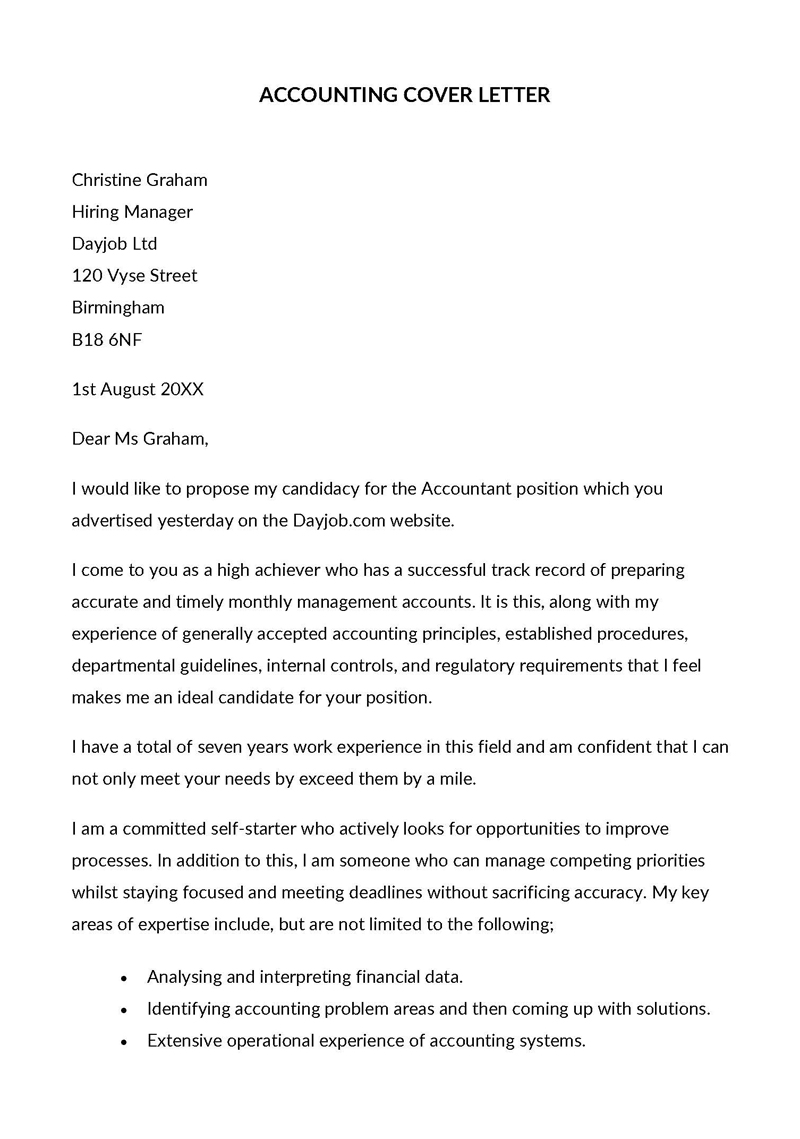
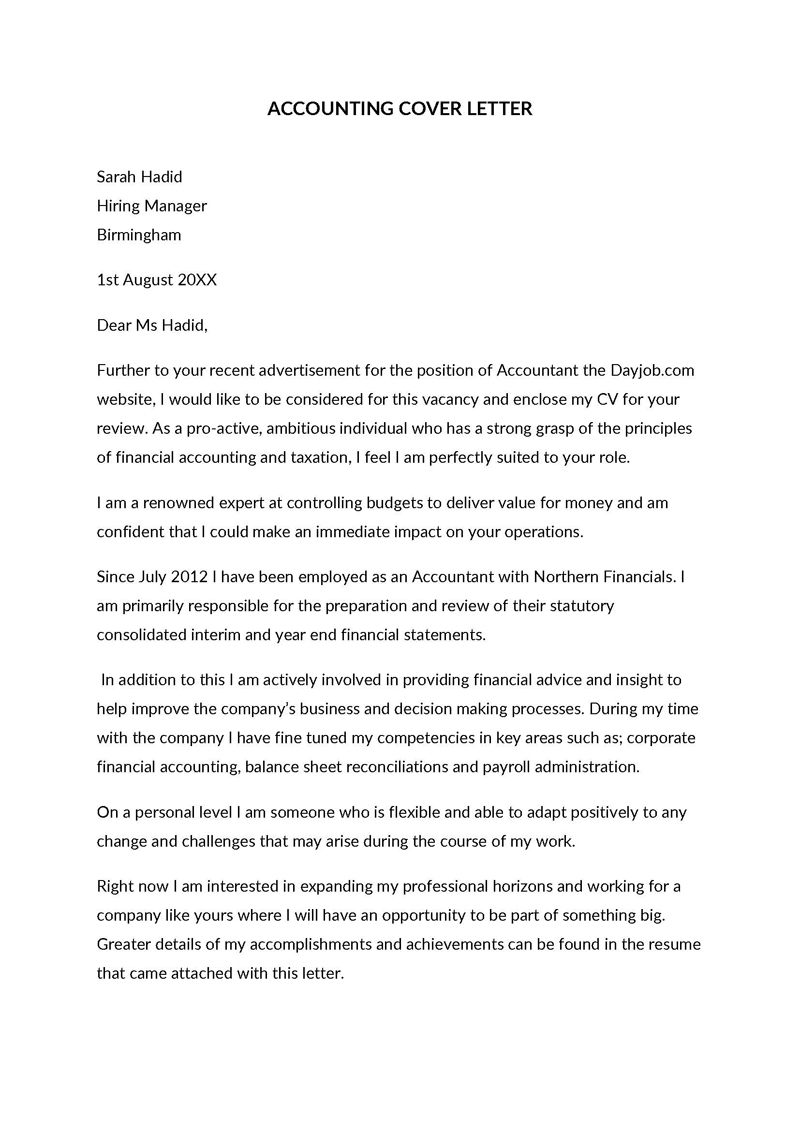
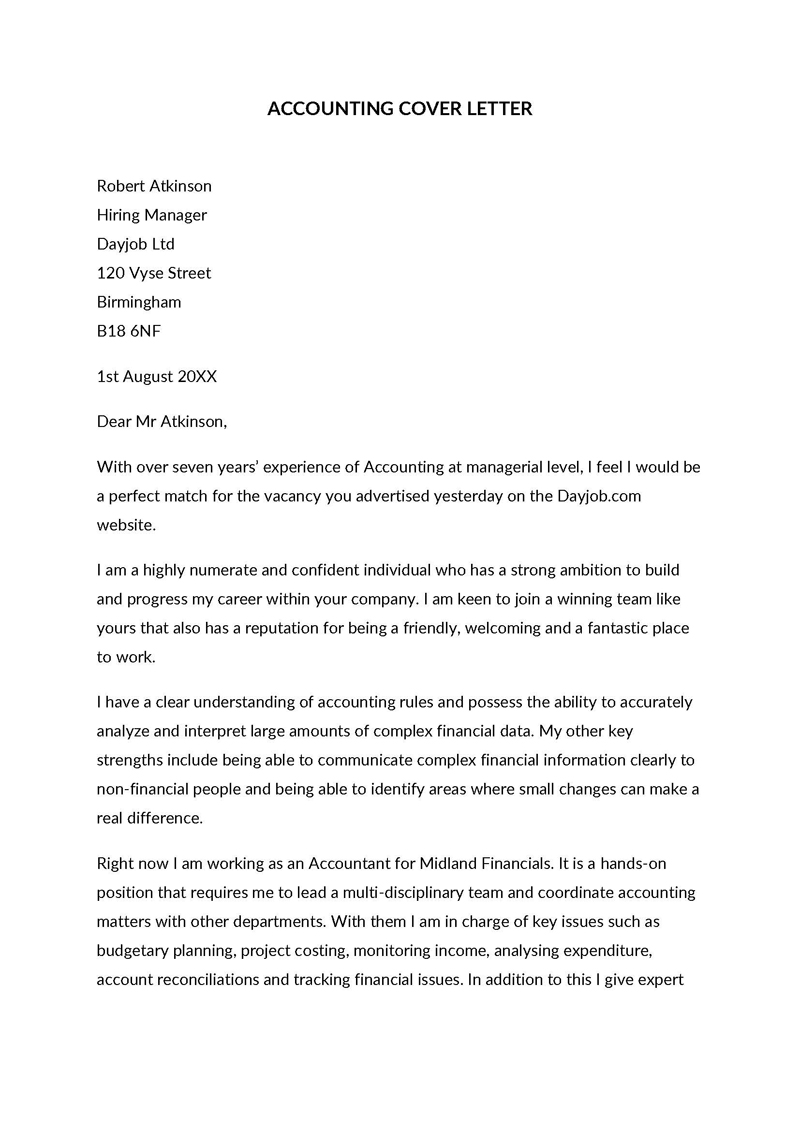
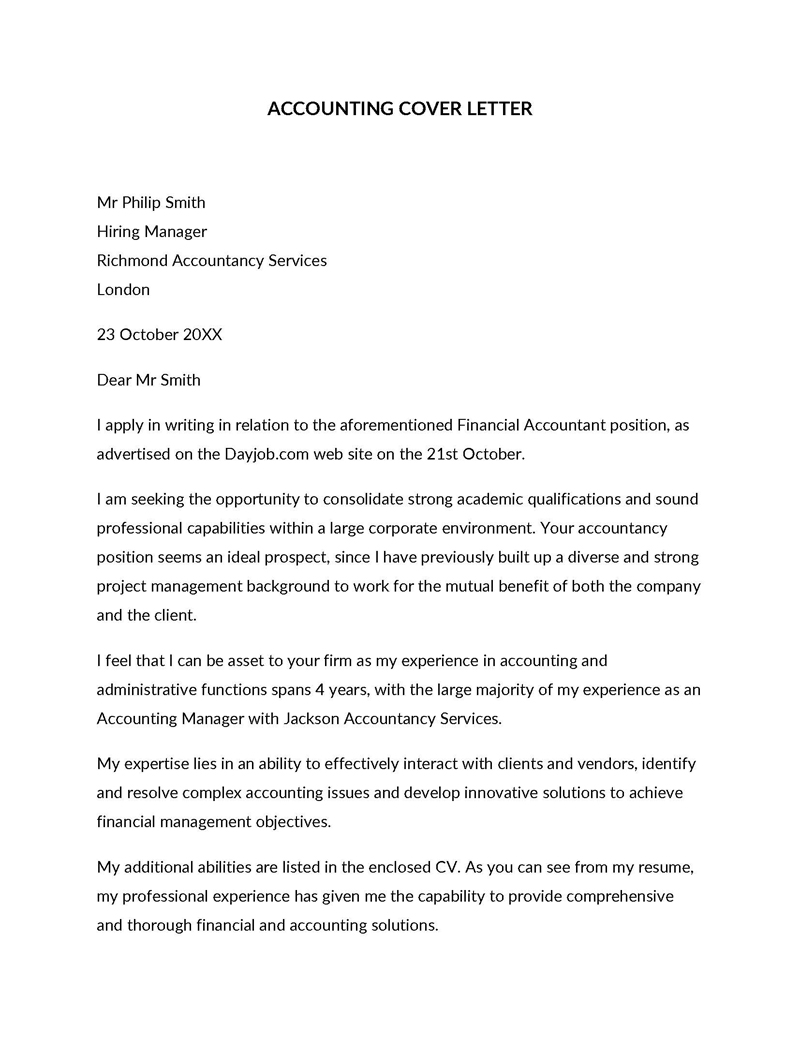
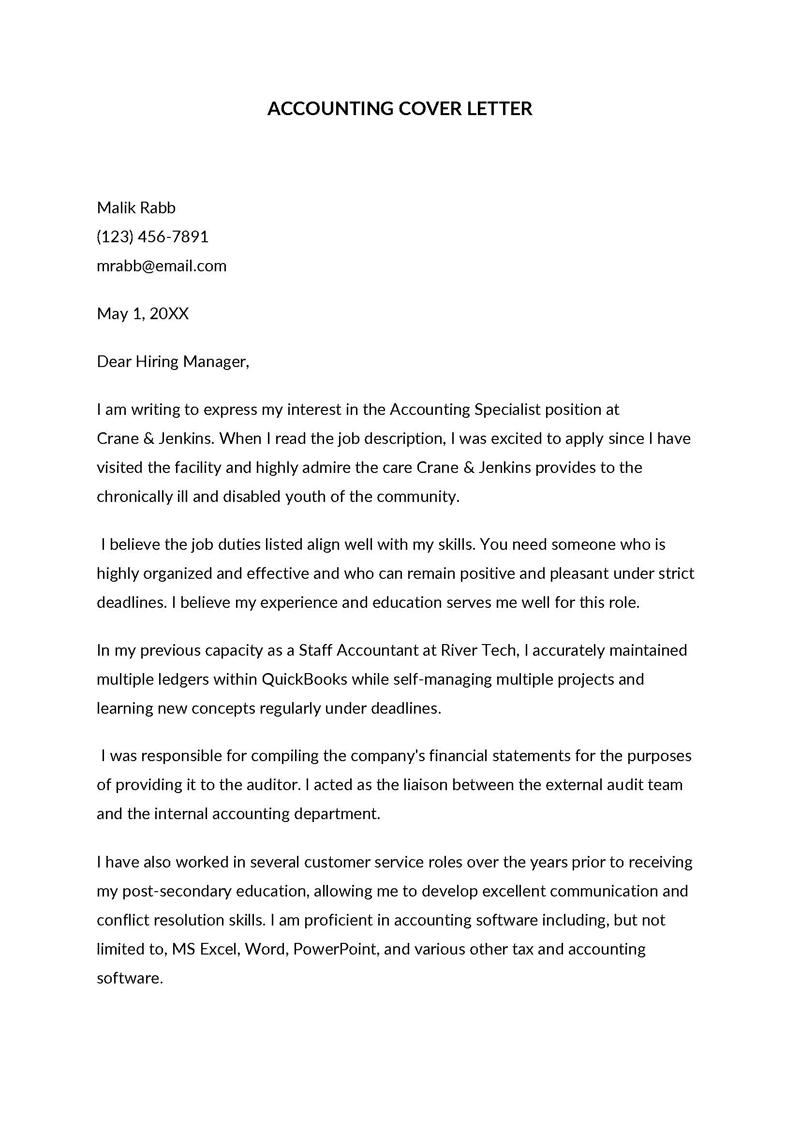
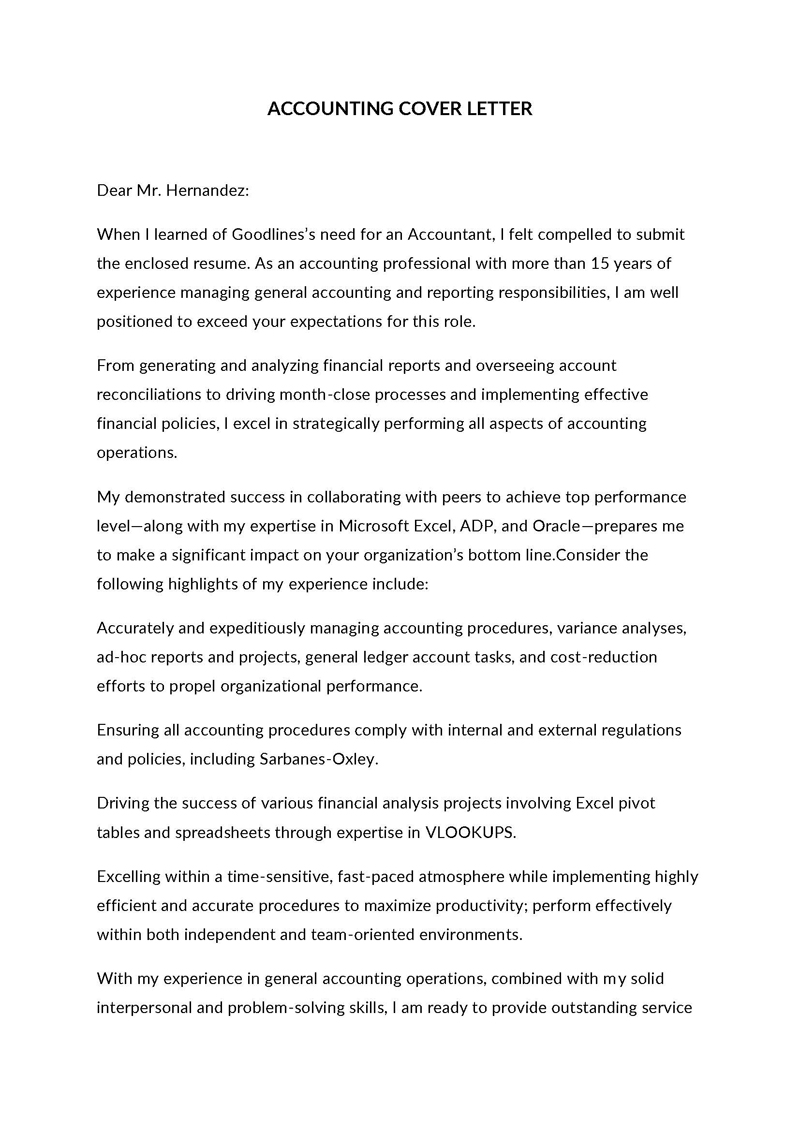
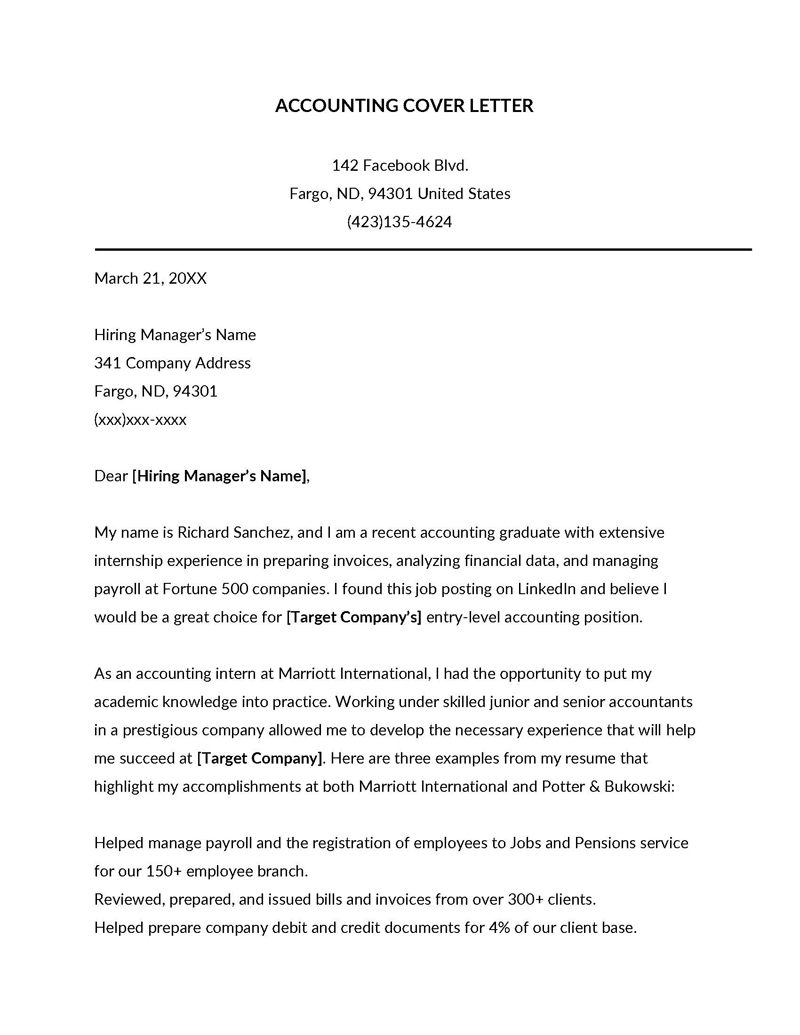
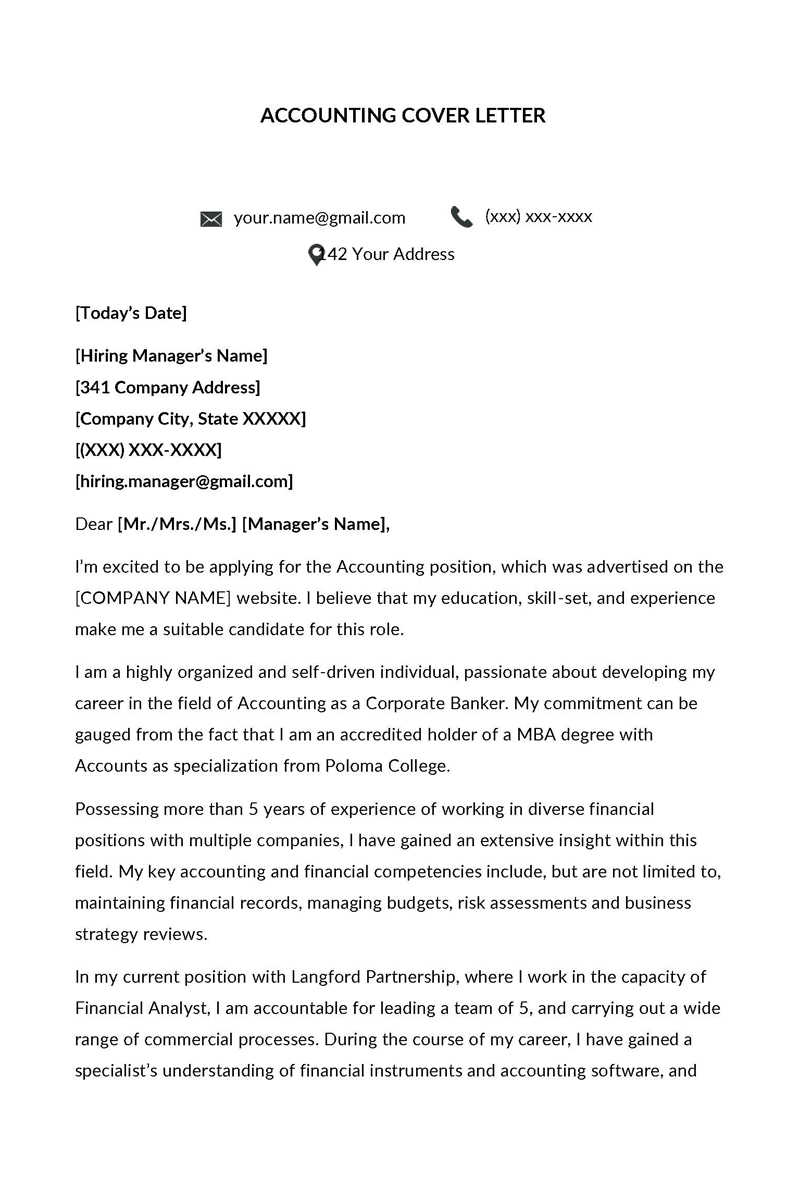
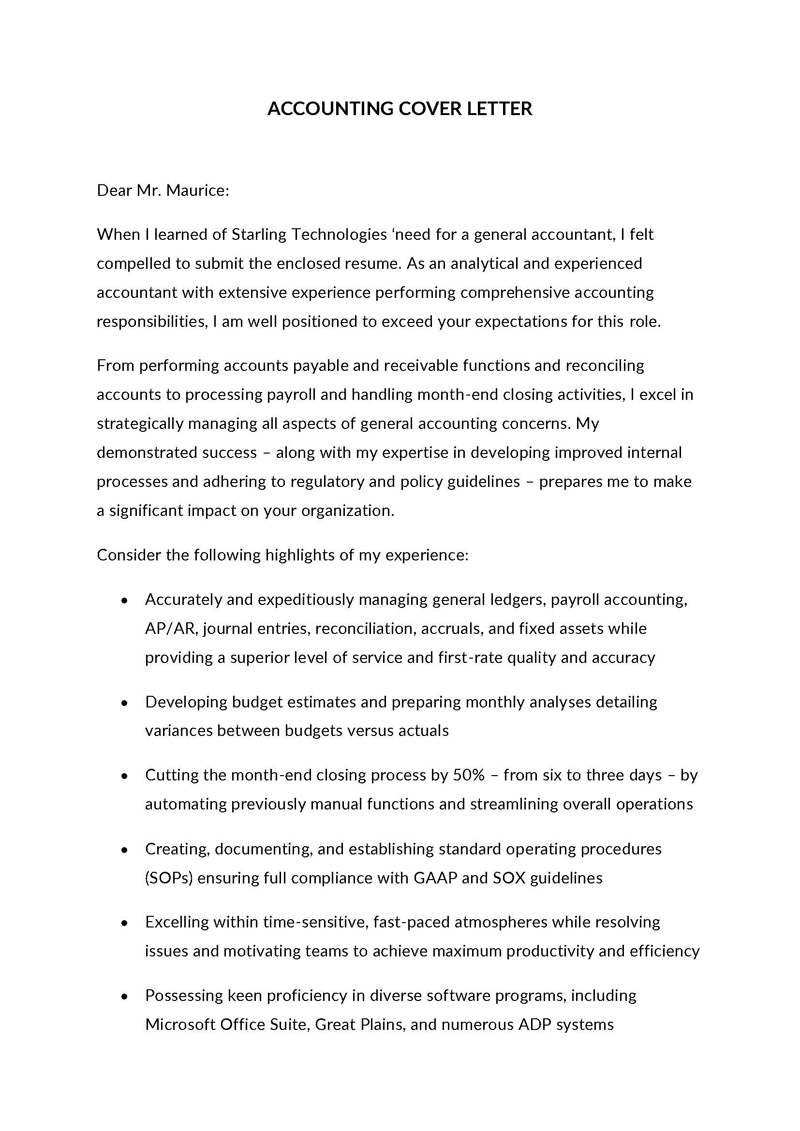
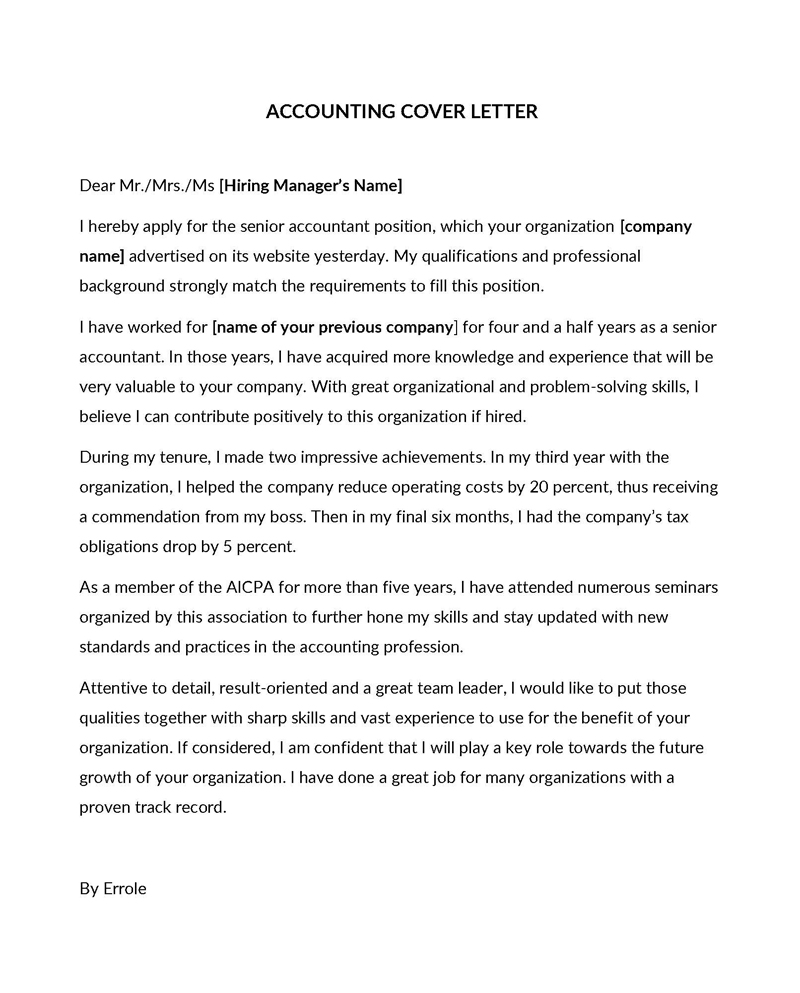
How to Write an Accounting Cover Letter
An accountant is a vital figure in any organization. Therefore, the cover letter should exhibit a high level of professionalism. This might sometimes be time-consuming but it is necessary. As an applicant, you can use the guide below to ensure you sell yourself accordingly to secure the job.
Section 1: Header
First and foremost, the cover letter should have a header at the top of the page. The header should identify the sender and the recipient. This information can be captured in the following way:
Include your personal information
Start the header by providing your details. Indicate your full name, designation, valid phone number, email, and address. You can also choose to add personal information, such as a LinkedIn profile URL.
City and date
When writing down the mailing address, ensure that you state all the relevant details, that is, street address, city, and state of residence. Location is an important consideration in the hiring process. Then, state the date when the cover letter was written. A cover letter, like standard formal letters, has to be dated.
Hiring manager’s details
The letter should then identify the hiring manager or recruiter. You should write down their full name and the capacity in which they operate in the company. Then indicate the company you are applying to by stating its name and official physical address. The address should take the format that indicates a street address, city, and state.
Section 2: Introduction
The next step is creating a formal introduction to the cover letter. The introduction can be made to include a formal salutation and a concise introduction of the applicant. It should be written as discussed below:
A greeting/salutation
Provide a formal salutation. Ensure to write a more personalized salutation by addressing the hiring manager directly instead of a generic greeting. Consider the following format; Dear Mr/Mrs/Ms, the recruiter’s name. If you don’t know their name, consider doing some basic research. Personalization makes the letter stand out from a mass-sent letter.
Briefly introduce yourself and state your interest
Next, introduce yourself to the recruiter. This is an area well known to influence recruiters’ decisions to proceed with reading the letter or not. An effective introduction will introduce you as a qualified accountant and highlight your interest in the position. The introduction can be made to be just a few sentences long.
Section 3: Body
The next step is crafting the body of the cover letter. The body is the section where you highlight why the recruiter should consider hiring you based on merit. Give concrete evidence that you deserve the job in this section.
Consider the following when writing down the information:
Showing how you’re the perfect fit
Start the body of the letter by presenting your case. You can review the job description, note down the key requirements of the position, and state how you meet these requirements. Highlight your education, training, and certification.
Some of the common requirements in accounting are:
- A bachelor’s degree in accounting, economics, finance, or business administration.
- Chartered Accountant (CA)
- Certified Public Accountant (CPA)
- Chartered Financial Analyst (CFA)
- Certified Internal Auditor (CIA)
- Certified Fraud Examiner (CFE)
- Chartered Global Management Accountant
- Certified Management Accountant (CMA)
- Enrolled Agent (EA)
- Certified Financial Services Auditor (CFSA)
Show your skills and experiences
You should then illustrate to the recruiter the skills and experiences that make you the best person for the accounting position. As an accountant, you will ordinarily be tasked with tracking the company’s financial transactions. You should then provide skills that are relevant to accounting.
Some examples of such skills are:
- Excellent written and verbal communication skills
- Organizational skills
- Excel and other accounting software
- Problem-solving skills
Also, include experiences from your past jobs that further illustrate why you are suitable for the position. Consider using statistical data to represent the results. Numbers are important to recruiters as they are easily interpretable.
Match your skills with job requirements
You should then demonstrate how your skills can be used to the benefit of the company. This section should show an experience where you used one skill or more and how you can replicate the same to help the company address its challenges.
State your interest in the job
The body of the cover letter can then be finalized by stating your interest in the position. You can align your career goals with the company’s goals, vision, and mission. Let the recruiter know the company suits your objectives and be specific.
Section 4: Conclusion
The last step is to finalize the cover letter. An exceptional conclusion will contain the following information:
End with a strong closing statement
Provide a strong closing statement to encourage the recruiter to invite you for an interview. Also, provide contact details that the recruiter can use to reach out. A phone number, email address, or bot will usually be sufficient.
Thank the employer/hiring manager
Next, thank the recruiter for taking the time to go through the entire cover letter. Politeness can go a long way in the professional sector. A summary of your qualifications for the position can also be given.
Sign off
Finally, end the letter with a complimentary close, a signature, and your full name.
Cover Letter Template for an Accounting Job
[Your Full Name]
[Your Address]
[City, State, Zip Code]
[Your Phone Number]
[Your Email Address]
[LinkedIn Profile (optional)]
[Date]
[Hiring Manager’s Name]
[Their Job Title]
[Company Name]
[Company Address]
[City, State, Zip Code]
Dear [Hiring Manager’s Name],
I am writing to express my interest in the [specific job title] position listed at [where you found the job listing] for [Company Name]. With a [degree type] in Accounting from [Your University] and [X] years of comprehensive experience in [specific accounting fields, e.g., tax, auditing, financial reporting], I am excited about the opportunity to contribute my expertise to your team. My background has equipped me with a broad skill set and a deep understanding of accounting principles, making me a well-suited candidate for this role.
During my tenure at [Previous Employer], I successfully managed [describe a significant responsibility or project], which led to [describe the positive outcome, e.g., increased efficiency, cost savings]. This experience honed my skills in [mention relevant skills, technologies, or methodologies], and I am confident in my ability to apply these successfully at [Company Name].
What excites me most about the opportunity at [Company Name] is [mention what attracts you to the company or role, e.g., the company’s commitment to innovation, the chance to work on certain types of projects]. I am particularly drawn to this position because it offers the chance to [describe a specific aspect of the job that interests you], aligning perfectly with my career objectives.
In addition to my professional qualifications, I have developed strong analytical and problem-solving skills, excellent attention to detail, and a proven ability to work effectively under pressure and meet tight deadlines. I am also adept at communicating complex financial information in an understandable way to non-financial stakeholders.
I am eager to bring my background in accounting, along with my passion for [specific interest related to the accounting field], to [Company Name]. I look forward to the possibility of discussing this exciting opportunity with you. I am available at your convenience for an interview and can be reached at [Your Phone Number] or via email at [Your Email Address].
Thank you for considering my application. I am looking forward to the opportunity to contribute to [Company Name] and am excited about the potential to help achieve its financial objectives.
Sincerely,
[Your Name]
Sample Accounting Cover Letter
Dear Jordan Lee,
I am reaching out to express my keen interest in the Senior Accountant position advertised on LinkedIn for Global Finance Corp. With over ten years of progressive experience in the accounting field, culminating in a lead role at Prosperity Partners Ltd., I am excited about the opportunity to bring my expertise in financial analysis, tax planning, and strategic budget management to your esteemed company. My career has equipped me with the nuanced understanding and practical skills necessary to navigate the complex financial landscapes of diverse industries.
At Prosperity Partners Ltd., I spearheaded a team that restructured the company’s financial reporting process, leading to a 30% reduction in month-end closing times while enhancing the accuracy of financial reports. This initiative not only streamlined operations but also improved decision-making processes, illustrating my capability to drive efficiency and accuracy in financial management. My proficiency in utilizing advanced accounting software, coupled with a strategic approach to financial planning, has been instrumental in optimizing financial performance and compliance.
The opportunity at Global Finance Corp appeals to me significantly due to your commitment to fostering innovation within financial management practices. I am particularly drawn to this role as it promises the chance to contribute to your team’s efforts in refining financial strategies and systems, a challenge I am eager and fully equipped to take on. The prospect of working alongside your team to drive financial success and operational excellence is highly motivating.
In addition to my technical abilities, I bring strong analytical and problem-solving skills, with a keen attention to detail and a commitment to upholding the highest standards of financial integrity and transparency. My experience has honed my ability to communicate complex financial information clearly to stakeholders at all levels, ensuring informed decision-making across departments.
I am eager to leverage my background in accounting and passion for financial strategy to contribute to the continued success and growth of Global Finance Corp. I look forward to the possibility of discussing how my experience, skills, and ambitions align with the needs of your team. I am available at your earliest convenience for an interview and can be reached at 555-678-1234 or via email at alex.rivera@email.com.
Thank you for considering my application. I am excited about the opportunity to contribute to your team and help achieve Global Finance Corp’s financial goals.
Warm regards,
Alex Rivera
Key Takeaways
The effectiveness of the cover letter for the Senior Accountant position stems from several key elements:
Clear Expression of Interest: The candidate begins by expressing a strong interest in the position and the company, immediately establishing relevance and enthusiasm for the role.
Detailed Experience and Achievements: By detailing specific achievements, such as improving the financial reporting process and reducing month-end closing times by 30%, the candidate effectively showcases their capability and directly relevant experience.
Alignment with Company Values: The candidate’s mention of being drawn to the company’s commitment to innovation within financial management practices demonstrates an alignment of values and goals, making them a potentially good fit for the company culture.
Skills and Competencies: The letter highlights the candidate’s proficiency with advanced accounting software and strategic financial planning, key skills for the role, underscoring their readiness to contribute effectively.
Problem-Solving and Communication Skills: Emphasizing strong analytical, problem-solving skills, and the ability to communicate complex financial information clearly indicates the candidate’s capacity for leadership and cross-departmental collaboration.
Professional Motivation: The candidate’s eagerness to face new challenges and contribute to refining financial strategies signals a proactive and forward-thinking professional attitude.
Call to Action: Concluding with a readiness for an interview and providing contact information encourages immediate action, making it easier for the employer to proceed with the hiring process.
Together, these elements create a compelling narrative around the candidate’s qualifications, achievements, and fit for the role, making the letter an effective tool in advancing their application.
Tips for Writing a Good Accounting Cover Letter
To improve the effectiveness of your cover letter, there are several considerations you should keep in mind.
They include:
Make a good start
Always aim to create an impression from the get-go. The best way to do this is to craft a strong introduction. Like a good impression, a good start will motivate or encourage the recruiter to review your letter.
Do your research and check the fact
Research is key to getting the information right before you include it in the cover letter. Conduct extensive research on the company and the writing process of the letter. Accurate information in the letter shows your attention to detail, which is a positive in accounting.
Write in an easy-to-read format
Design the cover letter to be easily legible. Use legible fonts and font sizes. How you present the letter is an indication of how you will present company documents if hired; therefore, ensure the cover letter best reflects your writing skills.
Present education and work experience
Use a reverse chronological order when outlining academic and professional qualifications. This implies you should start with experiences that occurred at the farthest date from the current date and work backward.
Put references on a separate page
If you are going to include references, place them on a separate page. References are not part of the elements of the cover letter.
Finish strong
Create a strong closing statement that prompts the hiring manager to review your application and resume.
Check spelling and grammar
Proofread your cover letter before submitting it and correct any grammar and spelling mistakes. Errors in the letter can hurt your chances of getting the job. Having someone else read the letter is an effective method of proofreading.
Dos and Don’ts of Writing an Accounting Cover Letter
When writing an accounting cover letter, the following dos and don’ts are worth implementing to improve the quality of your cover letter:
Do’s
- Always create a customized cover letter for each company you apply to and address the letter to the right party. Avoid copy-pasting previous cover letters. This will often require research.
- Keep the cover letter at least one page long, with 250-350 words at most. Individuals with extensive experience can, however, write it on two pages but not more than that.
- Borrow the best qualities from your resume and expound on them in the cover letter.
- Show some personality. Focus on not just selling yourself as an asset but also as an employee. Show some enthusiasm. Monotonous letters can be difficult to read. Showing some personality creates room for uniqueness, which is what the recruiter will often be looking for.
- Always proofread your cover letter before handing it to the company.
Don’t
- use technical language that is industry-specific or company-specific. Write the letter in a language that can be understood by individuals who don’t practice accounting or work in your company.
- Do not apologize for not meeting certain requirements needed by the company or lie about having met those requirements. Provide what you are actually good at and factual information.
- Do not copy-paste information from the resume or previous cover letters.
- Don’t provide unprofessional or outdated contact details. Use recent and professional contact details that can be used for effective communication.
- Don’t include information that does not add value to the cover letter. The information outlined should be related to the position and what the company is looking for.
Drafting a great cover letter is an essential step in your job search journey. When writing your cover letter, make sure that you properly reference the requirements listed in the job description. In the letter, also make sure that you reference your most outstanding or relevant qualities to help your employers see why the position would best suit you. By following the sample provided, we believe that you will be able to write a cover letter that best highlights your experience and qualifications. If you are ready to apply for your next role as an accountant, download our free sample templates today and get started on your journey.
Key Takeaways
A cover letter is an opportunity for you to market yourself as the most suitable candidate for the accounting position. You should ensure to mention your education, certification, training, skills, and relevant experiences. The letter should be personalized for every position you are applying for; reusing a cover letter can be more harmful than beneficial to your chances of getting a job. Ordinarily, keep the length of the letter at one page. One page is enough to provide precise information that can persuade the recruiter to hire you.












